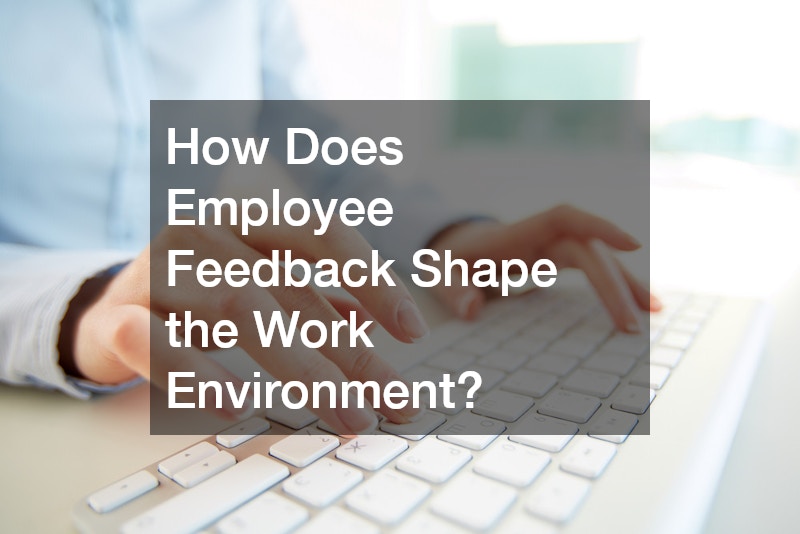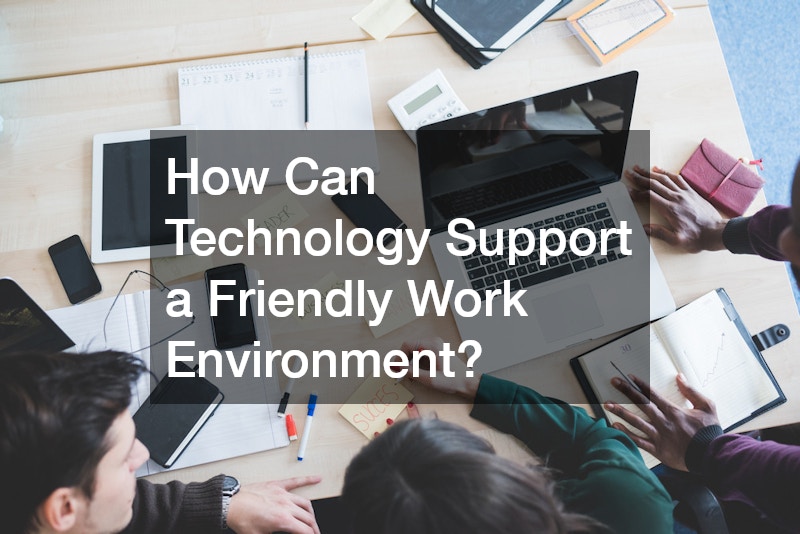In today’s fast-paced corporate landscape, the significance of cultivating a work culture that is both productive and friendly cannot be overstated. Organizations that prioritize such an environment not only reap the benefits of increased employee satisfaction but also enjoy enhanced performance and business growth. A productive and friendly work environment fosters creativity, loyalty, and efficiency, making it essential for companies aiming to thrive in competitive markets. Whether it’s a team of florists arranging beautiful bouquets or HVAC services technicians troubleshooting systems, the impact of a supportive culture is evident across various industries, from property management to computer technical support. This article will explore key strategies and practices that can help foster such an environment.
Why Is a Friendly Work Environment Important?
Improving Employee Morale
A friendly workplace plays a crucial role in boosting employee morale. When employees feel valued and appreciated, their overall satisfaction increases, leading to lower turnover rates. For instance, a florist team that regularly celebrates their achievements, whether big or small, tends to develop a stronger sense of community. This positivity not only uplifts the team’s spirits but also encourages them to perform better.
Enhancing Communication
Open communication is a cornerstone of a friendly work environment. When employees feel comfortable sharing ideas or concerns, it enhances collaboration and innovation. For example, a team of plumbers discussing challenges openly can brainstorm effective solutions more readily. Organizations that encourage transparent dialogue can create a culture where feedback is not just accepted but actively sought.
Boosting Productivity
Productivity is directly tied to the environment in which employees work. A friendly atmosphere reduces stress and anxiety, allowing individuals to focus on their tasks. Studies show that employees who enjoy their workplace are more engaged and committed, leading to greater output. Whether it’s through the implementation of a robust payroll system or providing access to essential resources like property management CRM software, ensuring that employees have what they need enhances overall productivity.
What are the Core Elements of a Friendly Work Environment?
Open and Honest Communication
Establishing open lines of communication is fundamental to creating a friendly work environment. Regular meetings, feedback sessions, and casual interactions can break down barriers and foster a sense of belonging. Encouraging team members to share their thoughts, much like photographers sharing their latest works, cultivates a culture of openness and trust.
Inclusive and Diverse Cultures
An inclusive workplace is essential for fostering friendship and collaboration. Embracing diversity allows for a variety of perspectives and ideas, which can enhance problem-solving capabilities. For instance, incorporating insights from a diverse team can lead to innovative solutions in areas like HVAC services, where different backgrounds contribute to unique approaches.
Encouraging Work-Life Balance
Promoting a healthy work-life balance is vital for employee well-being. Flexible work schedules and remote work options can help employees manage their personal and professional responsibilities more effectively. By allowing employees to tend to personal matters, such as family obligations or hobbies like photography, companies demonstrate a commitment to their staff’s overall happiness.
How Can Leadership Impact Workplace Friendliness?
Setting the Tone
Leadership plays a pivotal role in shaping workplace culture. By embodying the values of openness and respect, leaders can set the tone for their teams. For example, a manager in a property management firm who actively listens to their employees’ concerns fosters a more inclusive atmosphere, encouraging others to do the same.
Demonstrating Empathy
Empathetic leadership can significantly impact the friendliness of a work environment. Understanding employees’ challenges and being supportive can create a culture where individuals feel valued. Leaders who take the time to understand their team members’ personal and professional struggles often see a notable increase in team cohesion.
Recognition and Rewards Programs
Implementing recognition programs is an effective way to promote a friendly atmosphere. Celebrating achievements—whether it’s a successful project completion by a team of window cleaning services or reaching sales targets—instills a sense of pride and camaraderie among employees. Acknowledgment can range from simple shout-outs in meetings to more formal rewards, enhancing overall morale.
What Role Does Team Collaboration Play?
Fostering Teamwork and Cooperation
Collaboration is essential for a friendly work environment. Encouraging teamwork can lead to stronger relationships among employees, making it easier to navigate challenges together. For instance, business growth consulting firms that promote collaborative projects often see more innovative solutions emerge, benefiting both the team and the clients.
Collaboration Tools and Technologies
Utilizing collaboration tools can enhance communication and teamwork. Platforms that facilitate easy sharing of ideas, project management, and real-time communication help teams work seamlessly. Tools that support remote work, such as video conferencing software or wireless infrastructure assets, can keep teams connected, regardless of physical location, ensuring that friendly interactions remain intact.
Celebrating Team Successes
Recognizing and celebrating team successes fosters a sense of community and belonging. Whether it’s through team outings or simple celebratory emails, acknowledging achievements can strengthen bonds among employees. When teams come together to celebrate milestones, they reinforce the idea that they are part of a larger, supportive community.
How Can Physical Workspace Influence Friendliness?
Designing Open and Inviting Spaces
The physical workspace can significantly impact the friendliness of the environment. Designing open spaces that encourage interaction—such as communal areas for breaks or collaboration—can promote a more relaxed atmosphere. This is especially relevant in service-oriented industries like plumbing or HVAC, where teamwork is essential.
Access to Amenities and Comforts
Providing amenities that cater to employee comfort can enhance the workplace experience. Simple things, such as coffee stations, lounge areas, and ergonomic furniture, can make employees feel valued. Having a pleasant workspace allows individuals to focus on their tasks, ultimately boosting productivity and morale.
Prospective Remote Work Options
In the modern workforce, flexibility is key. Offering remote work options allows employees to create a comfortable working environment that suits their needs. Whether they prefer working from home or a local café, the freedom to choose enhances job satisfaction and promotes a positive work culture.

How to Address Conflicts in a Friendly Work Environment?
Conflict Resolution Strategies
Conflicts are inevitable in any workplace, but how they are addressed can make a significant difference in maintaining a friendly atmosphere. Implementing clear conflict resolution strategies can help teams navigate disagreements effectively. For example, having designated mediation sessions can allow employees to express their concerns in a safe environment.
Promoting Respectful Communication
Encouraging respectful communication is essential for minimizing conflicts. Training sessions that focus on communication skills can equip employees with the tools they need to interact positively, reducing misunderstandings. By fostering a culture where respect is paramount, organizations can create a more harmonious work environment.
Mediation and Support Systems
Providing mediation services or support systems can help employees feel supported during conflicts. Having access to a neutral third party can assist in resolving issues amicably. Organizations that prioritize mediation are often better equipped to maintain a friendly environment, even when challenges arise.
What Practices Encourage Inclusivity and Diversity?
Diversity Training and Education
Implementing diversity training programs can help employees understand and appreciate each other’s differences. Such initiatives can foster a more inclusive environment where everyone feels respected and valued. For example, businesses that specialize in window cleaning services can benefit from diverse teams that bring various perspectives to their operations.
Inclusive Hiring Practices
Creating inclusive hiring practices ensures that organizations attract a diverse range of candidates. By actively seeking to hire individuals from different backgrounds, companies can enhance their cultural richness and foster a more friendly atmosphere. This is particularly important in sectors like business growth consulting, where diverse viewpoints can drive innovation.
Promoting Cultural Awareness
Promoting cultural awareness within the workplace can enhance relationships among employees. Celebrating cultural events and encouraging discussions about different backgrounds can foster understanding and friendship. This initiative not only enhances inclusivity but also enriches the overall workplace culture.

How Does Employee Feedback Shape the Work Environment?
Establishing Feedback Channels
Creating robust feedback channels allows employees to express their thoughts and ideas openly. Regular check-ins, suggestion boxes, and anonymous surveys can help gather insights that shape the work environment. When employees see their feedback being acted upon, it strengthens their sense of belonging.
Implementing Employee Suggestions
Acting on employee suggestions demonstrates that their voices matter. By implementing changes based on feedback, organizations can enhance their culture and make necessary adjustments. This practice is essential for companies across various sectors, from florists to computer technical support services, to remain competitive and appealing.
Conducting Regular Surveys
Regular surveys can provide valuable insights into employee satisfaction and areas for improvement. By analyzing survey results, organizations can identify trends and address issues proactively. This not only fosters a sense of community but also enhances the overall work culture.
What Benefits Come from a Positive Work Culture?
Increased Retention Rates
A positive work culture leads to increased employee retention rates. When individuals feel valued and part of a supportive community, they are less likely to seek opportunities elsewhere. This is particularly true in industries like HVAC services, where skilled professionals are in high demand.
Employee Satisfaction and Well-Being
The benefits of a friendly work environment extend to employee satisfaction and well-being. When individuals feel appreciated, they are more likely to enjoy their work, leading to improved mental health and overall happiness. Organizations that prioritize this aspect often see higher levels of engagement and productivity.
Enhanced Company Reputation
Companies that foster a positive work culture enjoy an enhanced reputation in their industry. A friendly environment attracts top talent and retains loyal employees, ultimately contributing to the organization’s success. For example, businesses known for their supportive culture often become preferred employers in their sectors, whether that’s in property management or any other field.

How Can Technology Support a Friendly Work Environment?
Tools for Enhancing Communication
Investing in communication tools can significantly enhance workplace friendliness. Platforms that facilitate messaging, video calls, and collaboration can help bridge gaps between team members, making it easier to stay connected. For businesses, from window cleaning services to florists, these tools foster collaboration and camaraderie.
Platforms for Team Building
Utilizing technology for team-building activities can enhance relationships among employees. Online platforms that offer games, challenges, or virtual meet-ups can keep the spirit of teamwork alive, even in remote settings. For instance, business growth consulting firms can organize virtual brainstorming sessions or team challenges that encourage collaboration and creativity, ensuring that employees remain engaged and connected, no matter where they are.
Automation to Reduce Workload
Leveraging technology to automate repetitive tasks can free up employees to focus on more meaningful work. For example, implementing a modern payroll system or property management CRM software can significantly reduce the administrative burden on staff. This not only boosts productivity but also allows employees to engage in more collaborative, innovative projects, further enhancing the friendly work environment.
Conclusion
Fostering a productive and friendly work environment is a multifaceted endeavor that requires commitment and thoughtful strategies. By prioritizing open communication, inclusivity, and team collaboration, organizations can create a culture where employees feel valued and supported. Leadership plays a crucial role in setting the tone and demonstrating empathy, while physical workspace design and technology can further enhance workplace friendliness.
As businesses invest in these practices, they will likely experience significant benefits, including increased employee satisfaction, retention rates, and overall company reputation. The long-term positive impact of a supportive culture cannot be overstated; it leads not only to individual success but also to organizational excellence.
By adopting these strategies, companies—from florists to HVAC services and beyond—can cultivate an environment where employees thrive, collaboration flourishes, and productivity soars. In an era where work-life balance is paramount, nurturing a friendly workplace is not just beneficial; it is essential for sustainable growth and success. Whether through celebrating team achievements or utilizing modern technologies to streamline operations, the goal remains the same: to create a workplace that inspires, supports, and fosters a true sense of community.

